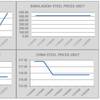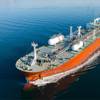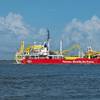Bureau Veritas has posted annual results which show the eight consecutive year of annual growth averaging over 17 percent.
Turnover of the Bureau Veritas group for 2003 was Euro1.283bn (US$1.51bn),
up 12 per cent on 2002. EBIT grew 25 per cent to Euro155.4m ($183m).
Consolidated net profit grew 10 per cent to Euro95.9m (US$113m). Final
results are subject to confirmation by the general assembly at the end of
June. Since 1995 the group turnover has multiplied by almost four times. Its
skilled workforce has been increased from 6,000 to over 19,000 today.
Bureau Veritas is now the world leader in certification and inspection
services to industry. This group area includes services to the energy and
offshore industries. Consumer product certification has also grown strongly
to put BV in second position globally.
BV's marine division has continued to grow, and forms the international
backbone of the group. Marine division turnover was up 13 per cent in 2003,
backed by a strong performance in newbuilding markets. The growing classed
fleet stands now at over 6,700 vessels of more than 41.2mgt. 2003 has seen a
strong growth in associated services and consulting. BV's leading position
in the LNG field gave it a 20 per cent share of the world LNG newbuilding
orders, and it is the only classification society active in all types of LNG
containment systems. Services to offshore energy are growing strongly, as
all major operators of FPSOs turned to BV for assistance with the lifetime
maintenance of their floaters.
Bernard Anne, managing director of BV's marine division, says, "There has
been a welcome outbreak of commonsense amongst classification societies
during 2003. The move towards common rules and to re-establishing trust in
IACS benefits the whole industry. Bureau Veritas has consistently supported
the role of IACS as a forum for developing common rules, and during 2003 we
were able to help IACS to react quickly and sensibly to flag states
proposals for setting new shipbuilding standards. Today IACS has two main
working parties developing common rules, one for tankers and the other, in
which BV is very active, for single and double-hull bulk carriers. BV also
participates in the committee overseeing the two working groups, helping to
make sure that common rules for tankers and bulkers are fully consistent,
and that all the societies will be able to interpret the rules in a common
manner."
Anne also highlights the strong performance of BV's marine division, and its
role in the growing BV group. "As part of a major international group with a
strong focus on certification and verification we can deliver unrivalled
resources from a network which no-one else can support. We also benefit from
major investments in research and development at group level, and synergies
across the group which share skills and experience. One key area where this
is of real benefit to clients is in the offshore energy field, where BV has
become the class of choice for large FPSOs."
Writing in the Bureau Veritas Marine Business Review 2003/4, Anne says, "As
the world's largest ship classification, certification and verification
group, BV is very strongly placed to develop high technology solutions to
issues which cross industrial frontiers. It is no surprise that during 2003
the operators of almost all existing FPSOs turned to BV for help with
managing the structures of their vessels. The technology in our VeriSTAR
family of tools, and the expertise and attention to detail of our engineers
combine to provide unique solutions to inspection of complex offshore
structures. Knowledge gained managing those issues can then be fed back into
tanker shipping and into the complex structures of jumbo container ships and
gas carriers.
"During 2003 BV was chosen to class the world's largest and most innovative
LNG carriers, breaking new frontiers of technology in power plant and
containment design. At the same time, as the LNG market opened up, the oil
and gas majors turned to BV to develop a CAP programme which would help them
ensure that older LNG ships taken on charter reached the high standards they
expect. As the only classification society present in every type of gas
containment system, and with the longest track record in LNG shipment, BV is
uniquely placed to produce a common sense condition assessment scheme which
will benefit both owners and charterers.
"Looking ahead, we are well placed to build on our classed fleet, which this
year saw the number of vessels and total tonnage rise yet again, while its
average age fell. With 6,700 vessels now in BV class, we have a wealth of
experience of working with regulators and owners. During 2003 we worked with
a number of flag States to help them develop effective maritime
administrations and trained over 1,000 security officers for ports and
shipowners. During 2004 we shall extend that skill transfer programme and
offer a number of training schemes to shipowners and operators as well as
administrations.
"BV is a great reservoir of expertise, and it also has the will to share
that expertise for the common good. The more we encourage co-operation
between class societies, regulators and yards, and the more we work closely
with industry, the safer and cleaner shipping will become. That's just
common sense."
Subscribe for
Maritime Reporter E-News
Maritime Reporter E-News is the maritime industry's largest circulation and most authoritative ENews Service, delivered to your Email five times per week










